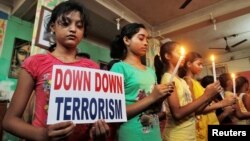The United States and India announced on Tuesday they are strengthening cooperation on fighting terrorism.
The two democracies will intensify intelligence sharing and specifically "work for the early operationalization of an agreement on exchanging information on known or suspected terrorists," India’s external affairs minister, Sushma Swaraj, told reporters in New Delhi.
The governments also agreed on a "joint cyber framework to reduce cybercrime," according to U.S. Secretary of State John Kerry.
Overall, ministers and officials of India and the United States are touting a significantly expanded strategic and economic relationship, which Kerry said "couldn’t come at a more important moment."
The wide-ranging second U.S.-India Strategic and Commercial Dialogue is the latest in a series of significant meetings and agreements that has moved traditionally non-aligned New Delhi into a significantly closer relationship with Washington amid rising concerns in both capitals about a more assertive China.
"The bilateral relationship is gradually entering a phase where India can certainly look forward to being regarded as a close ally or partner of the U.S.," said Reshmi Kazi, an associate fellow at the Institute for Defense Studies and Analyses, an autonomous research institution funded by India’s defense ministry. "There might be rising apprehensions in China about deepening of strategic ties between the U.S. and India for obvious reasons."
The "intensity of the bilateral relationship is unprecedented," said Swaraj, as she initiated the dialogue held at her ministry.
Issues under discussion range from U.S. quotas for temporary work visas to American assistance for upgrading India’s power grid.
India, the world’s largest democracy, in recent years has kicked aside numerous trade barriers. New Delhi has set a goal with Washington to expand bilateral trade five-fold to $500 billion annually.
To reach that goal, participants in the current dialogue need to “think bigger, act bolder,” said U.S. Commerce Secretary Penny Pritzker, the other Cabinet-level official attending from Washington.
"We must make it easier for Indian and American companies to buy from each other, to invest in each other, and to create with each other."
CEO forum
A simultaneous India-U.S. CEO Forum is being led by the chairmen of two conglomerates: Tata Sons' Cyrus Mistry and Honeywell's Dave Cote.
Scant information has been revealed about the security side of the discussions.
Kerry met Tuesday with India’s national security adviser, Ajit Doval. He is scheduled to hold talks Wednesday with Prime Minister Narendra Modi.
While the Pentagon would welcome a much more comprehensive defense relationship with India, some analysts in India say they believe New Delhi will only stray so far from its traditional policy of eschewing alliances.
"There has been no rush, and bilateral defense ties are being forged only when India has felt the need for greater cooperation with the U.S.," Kazi, who is also a visiting fellow at the Stimson Center, told VOA. "Hence, there is no abrogation of India's traditional diplomatic stance of being non-aligned."
Joint military drills
The dialogue in New Delhi comes a day after the two countries, at the Pentagon, signed a watershed agreement to allow their military forces access to each other’s bases for repairs and to replenish supplies; however, the Logistics Exchange Memorandum of Agreement (LEMOA) stops short of allowing each nation to set up bases and access to military facilities in the respective countries will only occur when they agree to operate together.
"India’s deepening military cooperation could possibly be interpreted as a signal to China not to disturb India’s maritime security in the Indian Ocean region," Kazi said.
U.S. and Indian forces are now also conducting significant annual joint drills, something else unimaginable a generation ago when the United States was a critical military backer of India’s archrival, Pakistan.
Next month’s joint drill, in the mountains of northern India, will include integration of both armies “working together down at the platoon level,” Lt. Gen. Stephen Lanza, who commands the U.S. Army's I Corps, told VOA.










